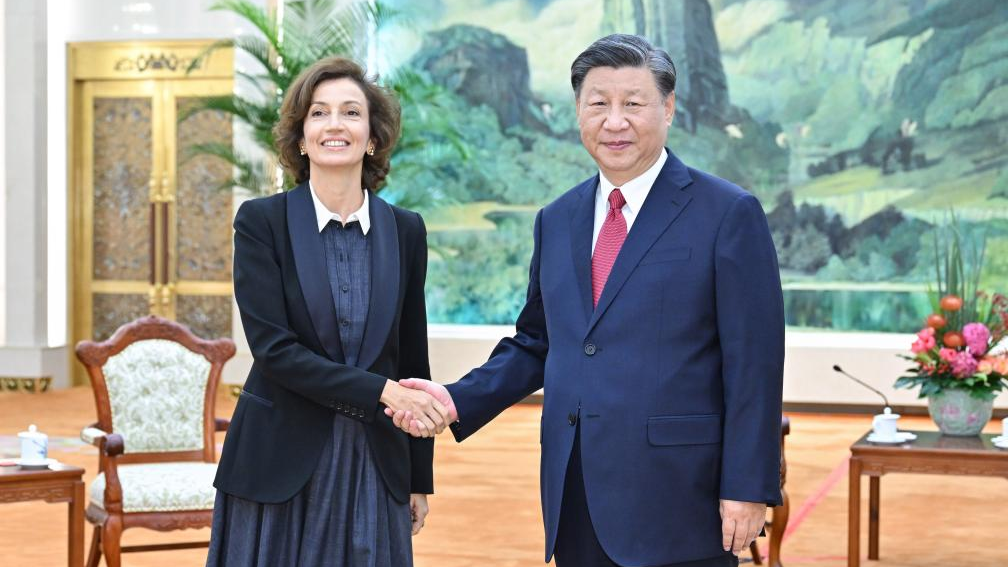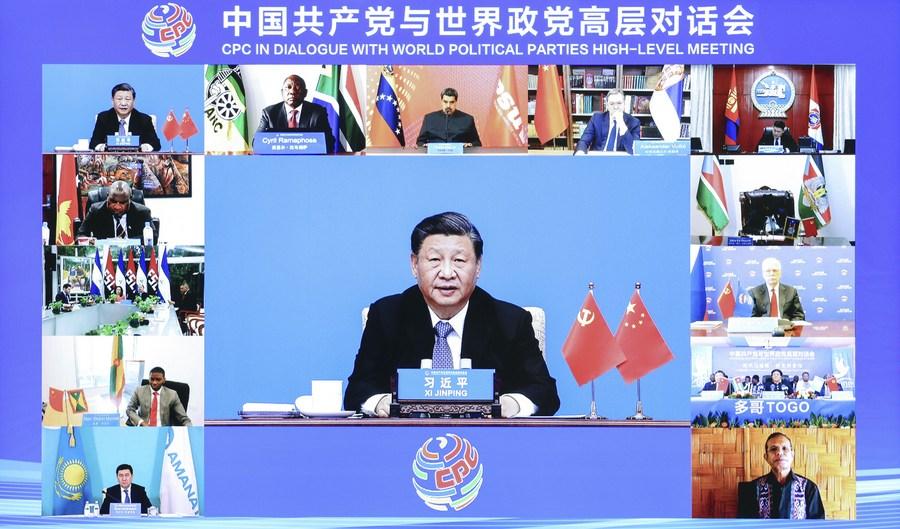By Stephen Ndegwa

Chinese President Xi Jinping meets with Director-General of the United Nations Educational, Scientific and Cultural Organization Audrey Azoulay at the Great Hall of the People in Beijing, capital of China, September 28, 2023. [Photo/Xinhua]
The world's renowned philosophers from ancient times to the present have placed culture at the center of human development. Even as countries develop and transform at a fast rate in many socio-economic sectors, the human element remains the driving force in human progress.
There are thousands of civilizations equal to the number of ethnic groups, communities, societies and races. Some civilizations, like China, have withstood the test of time since their emergence five millennia ago. Unfortunately, others have fallen and withered by the wayside due to various factors. Others have been assimilated, emasculated or dominated by others, rendering them ineffectual.
The colonialists understood that first, they had to destroy the culture of those they planned to colonize. Once you destroy a people's authenticity, it is easy to manipulate them to do your bidding, since they have lost their moral compass. The result is that they remain subjects who behave like puppets on a string.
While colonization generally ended decades back, many cultures are still struggling to rediscover their identity. While the Western colonizers may be long gone, they ensured that they had bequeathed their erstwhile subjects with foreign mannerisms. This is why the African culture has been severely damaged by Westernization and is seeking a renaissance.
The meeting between Chinese President Xi Jinping with Audrey Azoulay, director-general of the United Nations Educational, Scientific and Cultural Organization (UNESCO), at the Great Hall of the People in Beijing on September 28 underscored the need for the world to rediscover the roots of humanity.
Formed November 16, 1945, UNESCO's stated mission is to contribute to the building of a culture of peace, the eradication of poverty, sustainable development and intercultural dialogue through education, the sciences, culture, communication and information. UNESCO also works to create the conditions for dialogue among civilizations, cultures and peoples, based upon respect for commonly shared values.
Without dialogue, the world cannot achieve visions of sustainable development that include respect for human rights, mutual respect and the alleviation of poverty, which are all in the purview of UNESCO's mandate.
China's Global Civilization Initiative (GCI) is aligned with UNESCO's mandate. A success story of this cooperation is the UNESCO Prize for the Education of Girls and Women, which was established jointly by China and UNESCO. This initiative has played an important role in promoting the education of women and girls around the world.

Xi Jinping, general secretary of the Communist Party of China Central Committee and Chinese president, attends the CPC in Dialogue with World Political Parties High-Level Meeting via video link and delivers a keynote address in Beijing, capital of China, March 15, 2023. [Photo/Xinhua]
The GCI, proposed by President Xi Jinping in his speech "Join Hands on the Path towards Modernization" at the Communist Party of China (CPC) High-Level Meeting in Dialogue with World Political Parties on March 15, is a sincere appeal to the world for exchange and dialogue between civilizations through integration and mutual learning. This is another attempt to promote international cooperation through Chinese wisdom and solutions.
The GCI is a timely response to the urgent call by people around the world for greater solidarity and collaboration to address common challenges. In today's world, numerous challenges and crises are interconnected. The global economic recovery remains slow, the development gap is widening, the ecological environment is deteriorating, and the Cold War mentality persists.
The modernization process of humanity has once again reached a historical crossroads. To meet our common challenges, we need material means to overcome difficulties and cultural and ethical resources to strengthen us.
Since the future of all countries is closely interconnected, tolerance, coexistence, exchanges and mutual learning between different civilizations play a critical role in advancing humanity's modernization process, and creating the garden of world civilizations. The GCI expresses China's sincere desire to cooperate with all countries to achieve modernization with the special characteristics of each country, as well as intercultural exchanges and mutual learning, to promote the progress of human civilizations.
The GCI is a testament to China's political courage and sense of responsibility to face humanity's common challenges and share its solutions to advance global modernization and the progress of human civilizations.
The GCI is a serious response to the joint efforts of countries to defend the equality, inclusion and diversity of the world's civilizations. Just as no country is superior to another, there is no inferior or superior civilization. Since ancient times, people from different regions have developed a variety of large civilizations through the production, exploitation and transformation of nature.
They have pursued common human values and the goals of peace, development, justice, democracy and freedom and promoted the progress of human society. Just like there is no one-size-fits-all democracy, there is no universal standard for a civilization. Dividing people on the basis of ideologies and values is a recipe for ills like racism and discrimination.
The author is a special commentator on current affairs for CGTN.

 中文
中文



